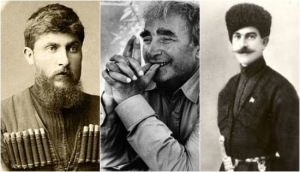July 14 Marks Birthdays of 3 Prominent Georgians
Today, Georgia marks the birthdays of three prominent public figures.
The first one is the famous poet Vazha-Pshavela, this being the pen name of the Georgian poet and writer Luka Razikashvili.
'Vazha-Pshavela' literally means 'a son of Pshavi' (a small historic region of northern Georgia, nowadays part of the Mtskheta-Mtianeti) in Georgian.
He was born on July 14th, 1861, and died at the age of 54.
Vazha-Pshavela embarked on his literary career in the mid-1880s. In his works, he portrayed the everyday life and psychology of his contemporary Pshavs.
He is the author of many world-class literary works – 36 epics, about 400 poems ('Aluda Ketelauri', 'Bakhtrioni', 'Gogotur and Apshina', 'Host and Guest', 'Snake Eater', etc.), plays, and stories, literary criticism, journalism and scholarly articles of ethnographic interest.
The second a popular Georgian writer and poet Nodar Dumbadze, who was born on July 14, 1928.
His first poems and humorous stories appeared in the Georgian press in 1950. His most famous novels include 'Me, Grandma, Iliko and Ilarioni', 'I Can See the Sun', 'The Sunny Night', 'Don’t Be Afraid, Mother', 'The White Banners,' and 'The Law of Eternity'.
He was awarded the Shota Rustaveli State Prize in 1975 and the Lenin Prize in 1980. He died in Tbilisi and was buried in Mziuri Park, which he founded in 1982 for the capital's children. In September 2009, his body was moved to the Mamadaviti temple in the Mtatsminda Pantheon.
As for the third important birthday, Kaikhosro 'Kakutsa' Cholokashvili was also born on July 14, 1888- a Georgian military officer and a commander of an anti-Soviet guerrilla movement. He is regarded as a national hero in Georgia.
Born of a noble family, Cholokashvili was a decorated officer of the Imperial Russian Army during World War I. After the Russian Revolution of 1917, he served in the ranks of the Democratic Republic of Georgia. Following the republic's overthrow in a Soviet invasion in 1921, Cholokashvili, with a band of followers, took to the mountains and fought a guerrilla campaign against the Soviet government in the province of Kakheti.
After a failed August 1924 anti-Soviet rebellion, during which Cholokashvili commanded the largest single rebel contingent, he fled to France, where he died of tuberculosis in 1930. His remains were brought from the Leuville Cemetery near Paris to the Mtatsminda Pantheon in Tbilisi, Georgia, in 2005.
By Ana Dumbadze












